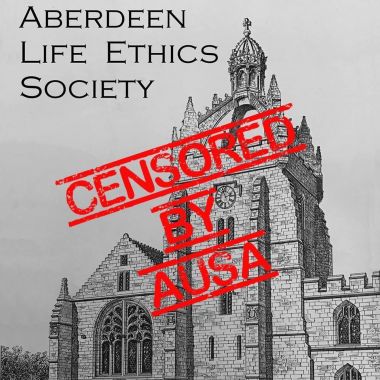Pro-life groups blocked at two Scottish universities

Pro-life groups at two Scottish universities are claiming discrimination and an attack on freedom of speech after they were prevented from affiliating.
The Students' Representative Council (SRC) at Glasgow University has ruled against the affiliation of Glasgow Students for Life. In a similar move at Aberdeen University, the Aberdeen University Students' Association (AUSA) prevented the Aberdeen Life Ethics Society from affiliating.
Without approval by the student bodies, the pro-life groups cannot become official university clubs, a status that would give them certain privileges such as being able to organise events on campus, have access funding for events, and set up a stall at the student freshers fair.
Lauren McDougall, president of the SRC, revealed that the council objected to the Glasgow group's campaigning against abortion.
'The executive view affiliation as a form of endorsement because affiliated clubs and societies are permitted to use our branding in their promotional material,' she told the Scottish Herald newspaper.
'Given the SRC's campaigning on a number of related social issues over the years, including support for the recent Repeal the 8th campaign in Ireland, it would be contrary to our ethos to endorse a society which calls for limited rights for women.'
The group has submitted a complaint against the SRC, accusing it of discrimination and curtailing its freedom of speech.
Grace Deighan, the President of Glasgow Students for Life, said: 'Our society exists to start a conversation about serious bioethical issues such as abortion and euthanasia, and we want to have a proper academic debate on the issue.
'The fact that the SRC would deny a platform for open debate on such an important issue is disappointing. We want to see this decision overturned not just for the pro-life cause, but also to protect freedom of expression at Glasgow University.'
Jamie McGowan, who acts as a legal advisor to Glasgow Students for Life, is optimistic that their complaint will be upheld.
'Their legal argument is pretty strong, given that "philosophical beliefs" such as those of the pro-life movement are considered to be a protected characteristic in Scots Law,' McGowan said.
The Aberdeen Life Ethics Society said its bid to become affiliated had been rejected because it conflicted with the AUSA's policy on abortion, which states that the institution is 'pro-choice' and will 'offer no funding, facilitation, or platform to any such group that may offer advice that conflicts with the advice given by either AUSA or a body/service recommended by AUSA'. Under the policy, the association also vows to 'oppose the unreasonable display of pro-life material within campus and at AUSA events'.
Writing in Aberdeen University's student newspaper The Gaudie, the group accused AUSA of censorship.
'AUSA's willingness to censor dissenting speech, even though such speech is protected by UK and EU laws, should be chilling to any fair-minded student who believes that the free exchange of ideas is essential to a university's ethos,' it said.
'Moreover, this decision exhibits AUSA's hypocritical enforcement of tolerance. Although our students' association prides itself on being radically tolerant, its willingness to block the formation of a minority-view society illuminates the lopsided nature of how tolerance is actually practised on our campus.'











